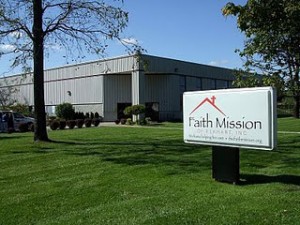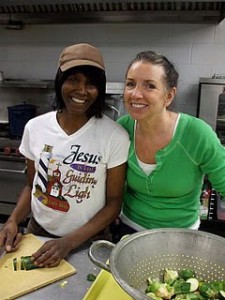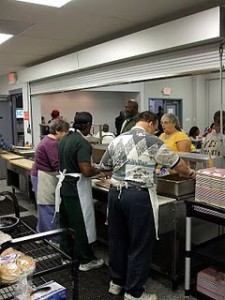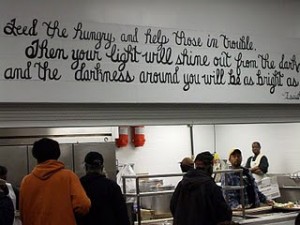Elkhart, Indiana—When I was a sophomore in high school, my preacher father felt God’s prompting—what our family always referred to, with utmost seriousness, as “the call”—to take over the pulpit of Elkhart’s McCoy Memorial Baptist Church.
The culture of this proudly self-contained midwestern town of 60,000 in Northern Indiana was quite different, to say the least, from the Manhattan suburbs which were all I’d known up to this point in my life.
 I was miserable here, as were, I later learned, my parents. After I’d gone away to college, they would eventually hear yet another call from God and move back East. Nearly thirty years passed, in which I had little reason or desire to revisit.
I was miserable here, as were, I later learned, my parents. After I’d gone away to college, they would eventually hear yet another call from God and move back East. Nearly thirty years passed, in which I had little reason or desire to revisit.
Then, the Great Recession began in 2008, and Elkhart was suddenly in the national news. President Obama visited twice as he tried to push his economic stimulus package. Whereas Elkhart once boasted one of the lowest unemployment numbers in the United States, it now had the highest. This shift, which occurred within a startlingly brief thirteen-month period, was caused by a one-two punch of high gasoline prices and shrinking consumer confidence. Almost overnight, the city’s main industry, manufacturing recreational vehicles, or what critics call “whales on wheels,” was rendered obsolete. At $4 a gallon, Elkhart found it couldn’t give away their notoriously fuel-inefficient R.V.s.
Reading about all of this in The New York Times, I grew curious to see how the years, and a soured economy, had changed things.
So, in the summer of 2009, I volunteered to cook for a few days in the kitchen at the Faith Mission of Elkhart.
A considerable irony, I discovered right away, is that the Faith Mission’s surprisingly grand appearance—its is a hanger-like structure, surrounded by mature landscaping, and sitting on a pleasant hill about three blocks from Elkhart’s Main Street—is explained by the fact that it once was the Recreational Vehicle Hall of Fame Museum. It is now a haven for those laid off by the R.V. factories, as well as those addled by drugs and drink, the mentally-unmoored, and people recently released from prison. Faith Mission also is adjacent to Washington Gardens, a housing project, as well an apartment building for low-income senior citizens. Many walk-in guests receive food stamps, Social Security, or disability checks, but these monies tend to run low by month’s end, which is when meal attendance spikes.
Such mistakes—cheese which has the wrong amount of food coloring, mutant donuts where the hole has closed up—arrive regularly, as do oddments from Olive Garden, ‘Lil Caesar’s and Pizza Hut that are past the company’s accepted expiration date, but still edible.
Mike Perez, the mission’s development director, gave me a tour. The mission has room for 135 people (mostly men, but a few women and children). Residents sleep in bunk beds, crammed tightly together, forty souls each in three not very large dormitory rooms. There are lots of rules. Everyone is up at 6 a.m., lights out at 10 p.m. Chapel is at 7 p.m., and attendance is mandatory.
Why are there so many more men then women, I ask.
“Men can be out on their own more, and take care of themselves. That’s obvious,” Perez replied. “But, I think it’s also that men are more stubborn in their sense of pride. Women? They will ask for help. They will go back to their families. They will somehow make it work. Men would rather live under a highway overpass, out in the cold, rather than admit they need assistance. Men get drunk, get angry, and burn bridges.”
This is a working mission, Perez tells me more than once. No one gets a free ride; to be a resident means you have to earn your keep. Some people do grounds and custodial work, others help out in the kitchen, which is run by two women, Kerry Czoch, who is white, and Ann Conner, who is black. Kerry and Ann have worked together for many years, and have the affectionate banter of an old couple. They call each other “dear” and “sweetie pie.” They say they’re each other’s best friend. “Besides God, that is,” Ann adds.
 Kerry has a husband, and grown kids, but she dresses like a teenager. When we first meet, she’s wearing a long-sleeve blouse completely covered with valentine’s hearts. Over this, she has on a red, short-sleeve T-shirt, on which are printed the words, “One World, One Love!” What appears to be the fragment of a red feather boa is looped around her hair, that dangles in a ponytail, somewhat lopsidedly, from the crown of her head. Kerry has a frenetic, desperate-for-drama energy, and a piercingly loud voice.
Kerry has a husband, and grown kids, but she dresses like a teenager. When we first meet, she’s wearing a long-sleeve blouse completely covered with valentine’s hearts. Over this, she has on a red, short-sleeve T-shirt, on which are printed the words, “One World, One Love!” What appears to be the fragment of a red feather boa is looped around her hair, that dangles in a ponytail, somewhat lopsidedly, from the crown of her head. Kerry has a frenetic, desperate-for-drama energy, and a piercingly loud voice.
Ann is a widow, her husband died nine years ago. Her sons are grown and no longer reside in Elkhart. Ann is soft-spoken, very thin, and wears a shaggy wig that’s anchored to her head with a baseball cap. She pads about slowly. A veteran of nearly 30 years of working in nursing homes before she came to Faith Mission, Ann has the tranquil energy of a person who is surprised by nothing.
Mike Perez calls them “Soup Can Kerry” and “Can Opener Ann,” his not-so-gentle mockery of their tendency to serve food that doesn’t have to be cooked, but is simply dumped from a can into a heating tray. This is a slight exaggeration, though I see Perez’ point, when the women tell me the menu for that day’s lunch: roast pork, canned boiled potatoes, canned peas and mushrooms, canned fruit “cocktail,” chopped iceberg lettuce mixed with canned green olives, and covered with a blizzard of canned grated cheese. For dessert, there’s a huge bowl of M&Ms in a color, speckled coppery pink, I’ve never seen before.
Turns out these are a factory reject and a tax-deductible donation from their manufacturer. Such mistakes—cheese which has the wrong amount of food coloring, mutant donuts where the hole has closed up—arrive regularly, as do oddments from Olive Garden, ‘Lil Caesar’s and Pizza Hut that are past the company’s accepted expiration date, but still edible. Can Opener Ann and Soup Can Kerry have to think of something to do with all this shit. Often enough, they decide to “go Mexican,” and create a catch-all buffet that they wishfully call a “Taco Bar.”
I learn all this as Kerry and Ann give me a fast and furious spin about their kitchen. Three minutes after we’ve first met, Kerry asks, “Ya ready to roll?”
“Put me to work,” I say.
 Ann points out three stainless steel vats, full of pork ribs and tenderloins that she roasted the afternoon before, and set in a refrigerator overnight. I’m requested to cut these into individual portions. There is a several-inch thick sludge of congealed fat on top of each pan. She instructs me to scoop around with my fingers, discarding most of this lard, but leaving some “for flavor.” I guess my face betrayed some dismay, as Ann quickly added, “We also have tuna salad, for those who don’t eat pork for religious reasons, or because they have hypertension.”
Ann points out three stainless steel vats, full of pork ribs and tenderloins that she roasted the afternoon before, and set in a refrigerator overnight. I’m requested to cut these into individual portions. There is a several-inch thick sludge of congealed fat on top of each pan. She instructs me to scoop around with my fingers, discarding most of this lard, but leaving some “for flavor.” I guess my face betrayed some dismay, as Ann quickly added, “We also have tuna salad, for those who don’t eat pork for religious reasons, or because they have hypertension.”
That’s not what worried me. Rather, I was thinking about the vegetarian recipes I cooked at a Delhi soup kitchen, and how much healthier, more wholesome and economical this food was in India. Later, Kerry will explain that pork is a rare treat on the mission’s menu, usually the “protein” is either chicken or beef, but there was somehow a glut of pork at the Indiana Food Bank, and she was able to buy at pennies a pound. This explanation only confounds the question. How can it be that, even in the midst of the Great Recession, pork is so plentiful in America, that nearly 200 pounds could be bought for $30?
Once I’ve de-larded and chopped up the meat, I begin my attack on countless cans – the opener being a manual, rather medieval-looking contraption that plunges a dagger into the can’s top and then rotates the cylinder about the sunken blade. When one of the residents shows me how to work this device, he overdoes it and crushes a five-gallon can with such force, the thing explodes, sending out a mushroom cloud of, well, mushrooms.
These stories sorta made sense; sorta didn’t. But, I couldn’t press too hard for more exact details. When you fall down a rabbit hole, I guess it can be tough to accurately chart your descent.
“It’s not a test of strength,” Ann murmurs gently, as she helps wipe up the mess. “There’s some skill involved.”
As we work, I chat with a few of my co-workers.
These stories sorta made sense; sorta didn’t. But, I couldn’t press too hard for more exact details. When you fall down a rabbit hole, I guess it can be tough to accurately chart your descent.
Mark Caldwell is a powerfully-built black man who is suffering from an infection he calls “pink eye.” Flat broke, he needs help in paying for his medicine. When I learn that it will only cost $6, I agree to spring for it, if I can tag along with him to the doctor and hear his story. Caldwell was a carpenter in RV factories, had a girlfriend and two ex-wives, with whom he has fathered a total of four children. He’s been a resident at the Faith Mission for one month, and arrived here straight from prison where he was serving time for a drunk driving charge. Caldwell is quick to admit he’s no angel. He’s a felon, and done time in prison before on an assault and battery charge. Still, he insisted in this latest scrape with the law, he was not drunk, but simply had consumed a couple beers. In a breath-a-lizer test, he explains, it doesn’t matter how much alcohol is in your system, but how recently you’ve consumed it. You thereby are much likelier to “blow numbers” if you’ve just had a drink, as was the case with Caldwell. He was locked up for 26 months. Meanwhile, he lost his job, one of his ex-wives got killed, and his girlfriend became a prostitute.
Lonnie Spearman, a young black man from Erie, Pennsylvania, had an argument with his father, with whom he was living up until a month ago, and decided to light off on a trip to Chicago, where he’d always dreamed of seeing the Sears Tower. With money he’d saved, he bought a one-way Amtrak ticket. Enroute, Spearman impulsively decided he wanted to see the football stadium at Notre Dame University, and he got off the train in South Bend, Indiana. A weekend spent at a $40 a night hotel, and what he vaguely described as a couple of “bad situations,” depleted the rest of his fortune. Penniless, he decided to walk back to Pennsylvania. Spearman got as far as Elkhart, where he was arrested by county police, learning only then that walking on railroad tracks is a misdemeanor. The cops brought him to Faith Mission, and here he was, opening up cans of fruit cocktail.
“Feed the hungry and help those in trouble.
Then your light will shine out of the darkness,
And the darkness around you will be as bright as day.” Isaiah 58:10
 This Bible verse is painted in bulbous black script on a cinderblock wall outside Faith Mission’s kitchen. The crowd that assembles here, three times a day, is almost exclusively black men, although there are a couple Latinos, a few white guys, and a handful of women and kids. Kerry says a prayer before each meal, and though she always demands that the men remove their hats before she does so, it still takes quite a while, with much singling out of laggards—Hey, bozo! Yeah, you in the knitted red cap! Get it off your friggin’ head!—before Kerry is satisfied that everyone’s ready to offer their (bare-headed) thanks to God.
This Bible verse is painted in bulbous black script on a cinderblock wall outside Faith Mission’s kitchen. The crowd that assembles here, three times a day, is almost exclusively black men, although there are a couple Latinos, a few white guys, and a handful of women and kids. Kerry says a prayer before each meal, and though she always demands that the men remove their hats before she does so, it still takes quite a while, with much singling out of laggards—Hey, bozo! Yeah, you in the knitted red cap! Get it off your friggin’ head!—before Kerry is satisfied that everyone’s ready to offer their (bare-headed) thanks to God.
“Dear Lord, we are so happy you’ve given us all another day in which we can try to get it right,” she usually says, in her prayer’s conclusion. “Bless this food to our bodies, oh God, may we learn to love and take care of each other, and will you continue to shake the ground beneath our feet.”
Days go by, and I see haunting and humbling things.
I wonder about this last. It seems like the ground is already pretty well shaken beneath most of the guests here, if Lonnie Spearman and Mark Caldwell are typical.
Days go by, and I see haunting and humbling things. I meet Tonnes Lovelady-Malone, who is the Faith Mission’s Emergency Care Director. She is black, with neat “corn rows” of hair, and dressed quite primly, in gray slacks and a starched Oxford cloth shirt. I’m flabbergasted when Lovelady-Malone divulges that she was, in her words, a “crack whore” for 27 years. “I was really hardcore,” she said. “Once, I went 11 days without sleep, high on crack the whole time. I was still a Christian, though, when I was turning tricks. Every time I got into some guy’s car, I would pray, saying ‘Lord, please let me get out of this alive.’”
What troubled me most were the wooden high-chairs that are set up in the mission’s dining hall. “Oh yes, this is a family-friendly environment,” Ann said, and explained that most of the children who came to lunches and dinners, lugging along an infant brother or sister, didn’t know where their parents were. The gurgle and laughter of these youngsters was sometimes the only noise I heard, as the adults tended to eat their meals in sullen silence.
On my last day at the Faith Mission, Kerry has me supervise a white guy named David Loken. He tells me, straight off, that he is a Mormon, as if this is something I’ll probably have a problem with. My failure to react to his shocking news seems to surprise Loken. He wears eyeglasses with bi-focal lens that are each larger than a deck of cards. He is balding, chubby, and extremely sweet-natured. He tells me he is “47 and a half,” and when he asks me how old I am, he replies, “Oh, then I will pretend I am your younger brother.”
I can’t really tell for sure, but it seems like Loken might be mildly learning disabled. He doesn’t look up much, and rarely makes eye contact. Is he retarded, I wonder, or has he just spent too much of his life alone? Maybe he has gone for many years—I’m guessing—without having any friends. As Loken and I chat together, he follows my directions with an exactitude I find unnerving. When I suggest a dice this size, he produces tall piles of green peppers cut to precisely that shape.
Ann has me scoop out several large containers of sour cream into an ugly plastic tub that will be placed on today’s Taco Bar. To amuse my new best friend David Loken, I decide to use some of his oh-so-carefully chopped peppers to spell out the word “Hola!” on top of this white lake of dairy product. When I explain the word’s meaning in Spanish, Loken laughs and laughs like this is the funniest thing he’s ever seen in his whole life. He’s overjoyed to the point that he reaches in under those enormous glasses of his to smear tears away from his eyes.
Later, Kerry gets the men to take their hats off, and after she prays, Loken and I each assume our positions on the serving line. I’m dishing up the ground beef; David mans the sour cream. To each and every person that comes through the buffet line, he points to the green lettering, and repeats, over and over again: “See? It says ‘Hola!’ That’s the Spanish word for ‘hello.’”



